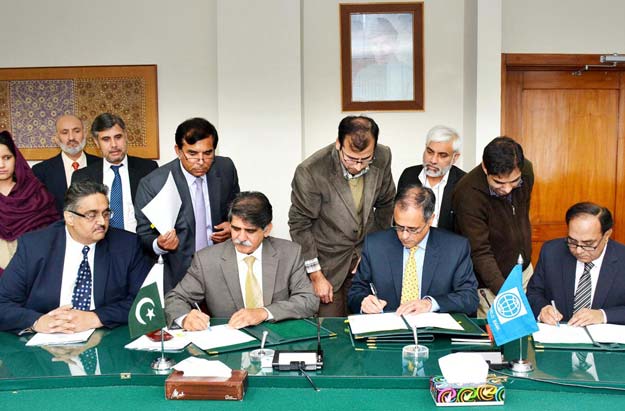
Pakistan has signed two agreements with the World Bank to obtain $188 million in loans for improving the irrigation system in Sindh and strengthening the public sector performance through better management of provincial public finances.
The lending agency has extended $50 million to support the implementation of governance reforms while $138 million will be spent on improving the irrigation system. The $138 million loan was given as additional financing to supplement the work carried out in first phase of the $150 million project.
The Sindh government missed most of the targets that it had agreed with the WB.

Economic Affairs Division Secretary Saleem Sethi and WB Country Director Rachid Benmessaoud signed the agreements.
The Sindh Public Sector Management Reform Project will help improve collection of sales tax on services and contribute to improved credibility of budget execution and increased timeliness of contract execution.
However, experts question the rationale of obtaining foreign loans in the name of implementing reforms. They argue that the reforms require bold political decisions and cannot be undertaken with the help of international lenders.
The project will support preparation of provincial reform plans for financial management, procurement and revenue mobilisation, according to a press release issued by the Ministry of Finance.
The second loan was sought for improving the efficiency and effectiveness of the irrigation water distribution system of three Area Water Boards in Ghotki, Nara and Left Bank. The loan is for 25 years with interest rate of around 1.5% in dollar terms.
While approving the additional financing for the irrigation project in December last year, the WB executive directors had questioned the increase in the project cost.
“A significant increase in project cost was highlighted by the directors,” said a WB document. The bank mission had attributed the rise in cost to the change in quantum of work, increase in unit cost and underestimation of cost during appraisal.
The executive directors emphasised that lessons must be drawn from the project design and implementation, including a careful and transparent monitoring of challenges, such as cost increases, inclusion of better intermediate targets for more accurate reporting of progress and strengthening engagement of citizens to ensure user satisfaction, the document said.
The Sindh Water Sector Improvement Project had been approved in September 2007 and was supposed to be completed by April 2013.
As agreed objectives could not be achieved despite massive spending, the WB extended the first phase to 2018. The bank has been facing criticism for funding failed projects.
Under the first phase, the WB had targeted to increase the efficiency from 52% to 100% in conveyance of distributaries, minor canals, watercourses and farms in the targeted areas.
However, according to a latest report on the outcome of the first phase, only 71% efficiency could be achieved by November last year.
The targets of reliability in water supply and equity in water distribution were also missed. Sindh is one of the poorest regions of the country and 56% of household income in the province comes from agriculture, directly or indirectly.
Published in The Express Tribune, March 12th, 2015.
Like Business on Facebook, follow @TribuneBiz on Twitter to stay informed and join in the conversation.

















COMMENTS (2)
Comments are moderated and generally will be posted if they are on-topic and not abusive.
For more information, please see our Comments FAQ